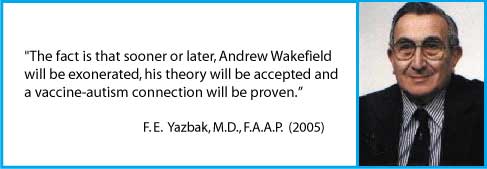
F. E. Yazbak, MD, FAAP
quotes
F. E. Yazbak, MD, FAAP
[2011 Jan] Why Don’t Children Regress Before They Turn One? by F. Edward Yazbak, MD, FAAP Worried about vaccination being blamed for Regressive Autism, the health authorities and vaccine promoters quickly circulated the idea that autism, supposedly a purely “genetic disorder”, manifested itself between 18 and 24 months of age. In time, that somewhat preposterous idea became an accepted scientific fact, even though the syndrome was originally called “Infantile Autism” or “Kanner’s Infantile Autism” and an infant is, by definition, a child under the age of 12 months......So why don’t any of those little ones ever regress - really, really regress - at 11 months of age and why do they all wait and regress all together, just after their first birthday and their “one-year” check-up whether they are in the United States, the United Kingdom, Israel, Egypt or Australia? Why don’t we ever, ever hear of babies regressing into autism during the vaccine break period, between 6 and 12 months of age or more specifically between age 9 and 12 months, when they are doing all those wonderful exciting things we need to call the neighbors, friends and family to witness or quickly find the movie camera to record?
WHY, WHY, WHY DON’T BABIES REGRESS BEFORE THEIR ONE-YEAR CHECK-UP?"Influenza vaccination seems to be ineffective at any age. It is therefore strange that people still attempt to prove that the useless vaccine is safe."---- [2006] Flu Vaccine Safety: Creating a Myth by F. Edward Yazbak MD
One hundred and seven (107) of the 786 claims were DTP-related death claims. The Special Masters of the U.S. Court of Claims, who heard the cases, awarded compensation in 73 (68%) of the 107 cases - after deciding that the deaths were vaccination-related. In fifty (68.5%) of the 73 compensated claims, the originally-stated diagnosis was SIDS. ----F. Edward Yazbak
[2008] Rapid Responses to Does cot death still exist?[2007 pdf]
Vaccination of Very Premature Infants By F. Edward Yazbak, MD, FAAP
All clinical trials of pediatric vaccines only
enroll healthy infants
and children and everyone makes certain that
the infant or child is healthy at the time the vaccine is administered.
There are no studies where sick or “slightly sick” infants are
vaccinated.
It is therefore
strange that pediatricians are asked to vaccinate less than perfectly healthy
infants and even stranger that they insist to do so.
In the recent Rochester study, the 16 ex-small preemies and the 16
normal infants used as controls received the MMR and chickenpox vaccines
at the age of 15 months. In real life, the CDC recommends that these two
vaccines be administered at 12 months of age when the ex-preemies are often more
vulnerable.
"The fact is that sooner or later, Andrew Wakefield will be exonerated, his theory will be accepted and a vaccine-autism connection will be proven. As the New Year comes around, Wakefield's research is being duplicated in prestigious centers in the United States. In addition, viral culture results are expected soon from the National Institutes of Health laboratories. "--[letter BMJ 2005] F. Edward Yazbak,
"Dr. Ed Yazbak, a pediatric infectious disease specialist from Boston, said research will not find a chromosome responsible for autism. He is a former professor at Brown University now studying the medical histories of children with autism in an effort to determine what triggered their condition. "Research will show there is a genetic predisposition to autism. What we have to find is the environmental insult," he said."--Experts: Redefine Autism as Systemic Illness
F. Edward Yazbak, Catherine J.M. Diodati
Abstract (HTML) Postpartum live virus vaccination: lessons from veterinary medicine (p
280-282)
Pregnant rubella-susceptible women are often revaccinated during the
postpartum period with the Measles, Mumps, and Rubella vaccine (MMR). It is known
that the rubella virus from vaccine is secreted in breast milk and persists in the nose
and throat for up to 28 days but it is not known whether the measles and mumps viruses are
similarly secreted. It is probable the measles virus from vaccine is.
F.
Edward Yazbak, Kathleen Yazbak. Live virus vaccination near a pregnancy: flawed
policies, tragic results (p 283-288)
Abstract (HTML)
Vaccination of women with live virus vaccines around conception has always been
contraindicated by the Center for Disease Control and Prevention (CDC) and the vaccine
manufacturer because of potential risks to the fetus (1,2). Nevertheless this dangerous
practice occurs and is associated with maternal health problems and a very high incidence
of early-onset autism in the children (3,4). Postpartum vaccination with live virus
vaccines has been recommended by the CDC (5), and described as `convenient' by the vaccine
manufacturer (6). This `routine practice' may lead to health and is also associated with
many health and obstetrical problems in the recipient, and is frequently associated with
autism in both current and future children (4,7). Re-vaccination often fails to produce
immunity, the very reason for which it was recommended.
